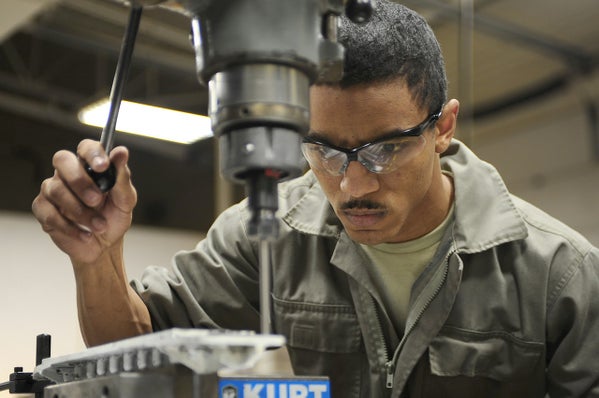Advanced Manufacturing
At A Glance: Cutting, Punching, and Press Machine Setters, Operators, and Tenders
Cutting, Punching, and Press Machine Setters, Operators and Tenders set up, operate, or tend machines to saw, cut, shear, slit, punch, crimp, notch, bend or straighten metal, plastic or other materials. They work with a variety of machines that may require manual or computer-aided controls. This position is essential in any manufacturing and production process. To become a Machine Setter, Operator or Tender usually requires a high school diploma and on-the-job training, certifications or apprenticeships. Machine Setters, Operators and Tenders earn an average of $16.57 an hour.
Entry Level Requirements
High School Diploma
To become a Cutting, Punching, and Press Machine Operator, Setter, or Tender requires at least a high school diploma. Most will require on-the job training and some may require additional credentials or certifications such as those offered by the National Institute for Metalworking Skills. Knowledge of computers and management may provide opportunities for advancement.

Material Engineering:
Top 5
Industry in our region.
How much can I make?
Hourly Rate: $11 - $25/HR.
Job Details: Cutting, Punching, and Press Machine Setters, Operators, and Tenders
Video produced and provided by CareerOneStop.org
Commonly Performed Tasks
Cutting, punching, and press machine operators, setters and tenders play an important role in the production process. While they often work independently, the results of their work are passed on to co-workers to undergo additional processes. Operators, Setters, and Tenders are responsible for many tasks on a daily basis.
- Examine completed workpieces for defects like chipped edges and sort defective pieces by flaw
- Measure completed workpieces to verify conformance to specifications using micrometers, gauges, etc.
- Start machines, monitor their operations, and record operational data
- Set up, operate, or tend machines to saw, cut, shear, bend, or straighten metal or plastic material
Required Job Skills
Cutting, punching, and press machine setters, operators, and tenders are usually on the shop floor, working with a variety of tools and materials to make products large and small. This type of work requires specific skills, abilities, and interests to do their jobs effectively.
- Identify, analyze, and solve complex problems
- Concentrate on a task without being distracted
- Knowledge of materials, processes, and systems
- Effective oral and written communication
- Knowledge of machines, tools, and materials
Education & Training Information
Programs and Opportunities
Community College of Allegheny County - North Campus
Program: Machine Technician
Certification: Certificate
Length: 18 Months
Pennsylvania College of Technology
Program: Machine Tool Technology
Certification: Associate's Degree
Length: 2 Years
Butler County Community College - Main Campus
Program: Machine Tool Technology
Certification: Certificate
Length: 1 Year
Eastern Gateway Community College - Youngstown Campus
Program: Machining
Certification: Associate's Degree
Length: 2 Years
Westmoreland County Community College
Program: Journeyman Machining Technology
Certification: Certificate
Length: 1 Year
Community College of Allegheny County - South Campus
Program: Machine Technician
Certification: Certificate
Length: 18 Months
